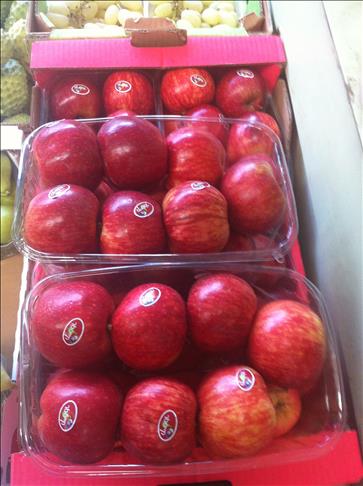
GOLAN HEIGHTS
Despite a two-year armed conflict in Syria and a host of Israeli restrictions, the people of the occupied Syrian Golan Heights continue to export their trademark apples back to their homeland.
"We usually sell our apples inside Israel and export some of them to Syria because the Israeli authorities only allow us to export a limited amount through the Quneitra border crossing," Yousef al-Sayed, an apple farmer from the Golan, told Anadolu Agency.
"The Golan apple is one of the best kinds of apple in the world," he boasted. "It is rarely infected by diseases or insects."
Farmers in the Golan began exporting apples to Syria in 2005. Before that, their produce had been limited to markets in Israel.
Golani apples account for between 30 and 35 percent of the apples available in the Israeli market.
Apple cultivation represents a main source of income in the Golan Heights, a Syrian region occupied by Israel in the 1967 Middle East War.
In 1981, the self-proclaimed Jewish state officially annexed the territory.
The Golani apple is characterized by its excellent quality and distinctive taste.
Farmers in the Golan began cultivating apples in the 1950s.
Apple crops are harvested every year in March, in an event that the entire 20,000 Syrian Druze community - takes part in.
- Solidarity -
With the outbreak of the war in Syria more than two years ago, farmers of the Golan feared they would no longer be able to export their apples to Syrian markets.
In 2012, they were unable to export any apples to the war-torn country due to a ban imposed by Israeli authorities.
This year, however, they have already exported 18,000 tons of the fruit to Syria via the Quneitra border crossing.
According to Israeli officials, this is considered the largest volume of apple exports to Syria since 2005.
"We as Syrians have every right to move or export any product manufactured inside the Golan Heights to Syrian territory even with the current situation in Syria," Golani farmer Ismat al-Beik told AA .
"Thank God that, despite the bad situation and the crisis, we didn't stop exporting apples through the Quneitra crossing," he said.
"We aren't afraid that the bad situation in Syria will affect apple sales," said Bahjat Nasrallah, another farmer.
"We don't send apples to Syria for profit, but as a way to express our connection with our mother country."
englishnews@aa.com.tr
Anadolu Agency website contains only a portion of the news stories offered to subscribers in the AA News Broadcasting System (HAS), and in summarized form. Please contact us for subscription options.







